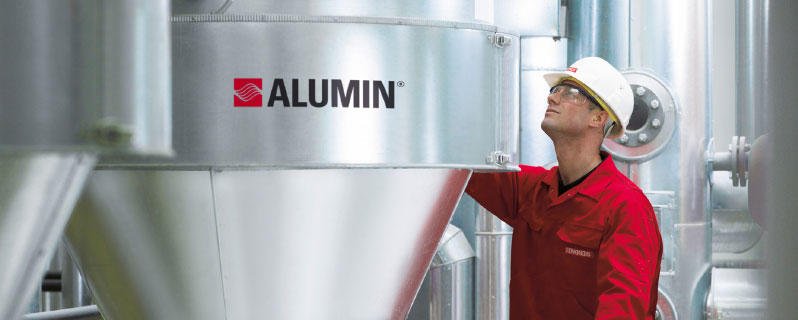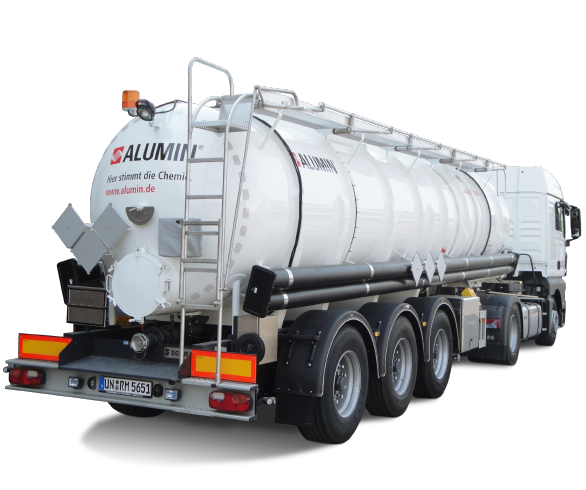The world of the
REMONDIS Lippe Plant
A waste product transformed into a cleaning product – thanks to the state-of-the-art technology at the Lippe Plant. We turn solutions containing aluminium into a highly effective precipitating agent that is used, for example, at sewage treatment plants.

A quality brand
Global situation
Water is becoming scarcer and scarcer. In 30 years’ time, global demand for fresh water will be three times higher than it is today.

Plant capacity

Production process
Solutions containing aluminium are generated by industrial businesses – for example, by companies treating the surfaces of aluminium parts. We use complex cleaning and filter systems at the Lippe Plant to transform these solutions into the specialty chemical, sodium aluminate. Thanks to its product properties, sodium aluminate is an excellent precipitating agent. In other words, it binds itself to unwanted substances in liquids as a result of a chemical reaction. In this case, the unwanted substance is phosphate. Sewage treatment plants use sodium aluminate to reduce the phosphate content in their wastewater – an extremely important process in wastewater treatment.
Sodium aluminate from the Lippe Plant is produced using a process the company developed itself and has its own name: ALUMIN. We are able to adapt ALUMIN to meet our customers’ exact requirements by using different formulas which involve the partial or full use of primary raw materials. The brand’s most significant feature here is the high quality of the product. A further plus point is that our production of ALUMIN helps protect the environment as we recycle a residual material for reuse instead of simply disposing of it – for example, by incinerating it or sending it to landfill.

Producing sodium aluminate from waste – as we do at the Lippe Plant – is an excellent way of conserving resources as it reduces the need for aluminium primary raw material
Besides being used to treat wastewater, ALUMIN also acts as a raw material for producing white minerals

ALUMIN’s high alkalinity makes it particularly suitable for soft water – i.e. water with a low pH value – as it helps here to balance out the pH values
While ALUMIN is also used as a raw material in industrial production processes and by the construction sector, its primary use is in industrial wastewater treatment facilities and, above all, in sewage treatment plants. The product’s properties offer two clear advantages here. Thanks to its high pH value, ALUMIN helps prevent the formation of filamentous bacteria and so increases the overall efficiency and functionality of sewage treatment plants. What’s more, it acts as a precipitating agent and eliminates the phosphate in the water. This is important as high amounts of phosphate – which, in itself, is actually essential to life – can have a hugely negative impact on the environment. High levels of the nutrient, phosphorus, in rivers and lakes, for example, can result in a rapid growth of algae and water plants which, in turn, disrupts the ecosystem.


The sodium aluminate production facilities at the Lippe Plant are able to store 100,000 tonnes. Large quantities of ALUMIN can be supplied, therefore, whenever they are needed
The tanks that are used to store the sodium aluminate produced at the Lippe Plant date back to when the site was an aluminium plant. This means that we are not only making the most of the structures that have been around for many decades – recycling our own plant so to speak – we have also created a USP that sets us apart from our competitors. The size of the tanks are much, much bigger than are normally found at a sodium aluminate production facility. All in all, we are able to store far more ALUMIN than we can produce in a whole year (current annual production lies at 44,700 tonnes). As a result we can offer a reliable service to customers at both ends of the supply chain: we not only always have the supplies of sodium aluminate needed, we can also accept practically any amount of input material, i.e. residual materials containing aluminium.
Learn more about the synergies at the Lippe Plant
A number of complex steps are needed to transform aluminium alkaline solutions and filter cake into high quality sodium aluminate. The input material must, for example, be filtered to remove any suspended or solid matter. Indeed, the production process ranges from the separation of solids, to evaporation, all the way through to liquid filtration. All the states of matter are in there. Is this bringing back memories of your chemistry lessons at school?
The ALUMIN production process

The solids in the input material are removed by allowing them to sink to the bottom of the vessel.

The heavy metals are removed; the quality of the raw material is classified during this stage as well.

A dissolution process is used to determine the concentration of the aluminium.

The quality of the ALUMIN product is defined by feeding the material through a five-stage evaporation unit.

The intermediate product is stored until it is needed.

The material is fed through a membrane chamber filter press. High pressure is used here to force the material through filter fabric to produce a finely filtered product (ultra-filtration).

An inspection is carried out by the accredited UCL laboratory at the end of the production process to check the quality of the product and analyse the batches. Once approved, it is then sold on the market.
Here in Germany, we can get the water we need simply by turning on a tap. What we often forget, though, is that fresh water is a valuable resource that hundreds of millions of people can’t access so easily. What makes the situation even more problematic is that the countries that have difficulties with their fresh water supplies often don’t have the water processing facilities they need. Such facilities are essential across all continents if the growing demand around the world for drinking water is to be met. And what has all this got to do with the sodium aluminate from the Lippe Plant? A great deal actually. The know-how and technology that have been developed here over the years have been making their way around the globe helping to ensure other regions have a reliable supply of water as well.

Technology transferred to the other end of the world: expertise from the Lippe Plant is in high demand – also in China. The Chinese government has initiated a major environment protection programme which also aims to drive forward the whole subject of water processing

Diese Seite verwendet aktuelle Techniken, die in dem von Ihnen verwendeten Browser unter Umständen nicht korrekt
angezeigt werden können.
Bitte aktualisieren Sie Ihren Internet-Explorer oder weichen auf einen anderen Browser wie Chrome oder
Firefox aus.
Schließen